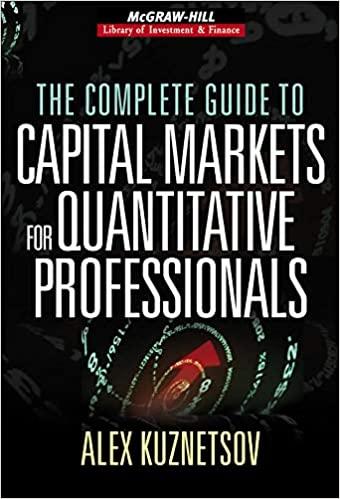Question
TRUE OR FALSE 1) A non-interest bearing checking account is still considered an investment. 2) Earning a high rate of return with little or no
TRUE OR FALSE
1) A non-interest bearing checking account is still considered an investment.
2) Earning a high rate of return with little or no risk is a realistic investment goal.
3) Underwriters are responsible for promoting and facilitating the sale of securities.
4) Only U.S. corporations can list their stocks on the NYSE.
5) A market maker brings together buyers and sellers in an auction market.
6) Margin trading requires the borrowing of securities.
7) An investor who mistakenly buys the wrong stock because the symbols are similar has 24 hours to undo the trade.
8) Investors who are aware of current economic, political, and market events tend to make better investment decisions.
9) An index measures the current value of a group of stocks in relation to a base value established previously.
10) The basic function of stockbrokers is to execute client orders at the best possible price.
11) Investors can be confidently predict future returns on an investment by studying its past performance.
12) Meaningful measures of an investment's return must consider both income and capital gains.
13) The financial concept of time value of money is dependent upon the opportunity to earn interest over time.
14) Compound interest is interest paid not only on the initial investment but also on any interest earned after the initial investment.
15) If the discount rate is appropriate for the level of risk, a satisfactory investment will have a present value of benefits equal to or greater than than the present value of costs.
16) The required return on a risky investment includes a real rate of return, an inflation premium and a risk premium.
17) If the risk-free rate of return is less than the inflation rate, the real rate of return is negative.
18) A portfolio that offers the lowest risk for a given level of return is known as an efficient portfolio.
19) If the actual rate of return on an investment portfolio is constant from year to year, the standard deviation of that portfolio is zero.
20) Most assets show a slight degree of negative correlation.
Step by Step Solution
There are 3 Steps involved in it
Step: 1

Get Instant Access to Expert-Tailored Solutions
See step-by-step solutions with expert insights and AI powered tools for academic success
Step: 2

Step: 3

Ace Your Homework with AI
Get the answers you need in no time with our AI-driven, step-by-step assistance
Get Started


